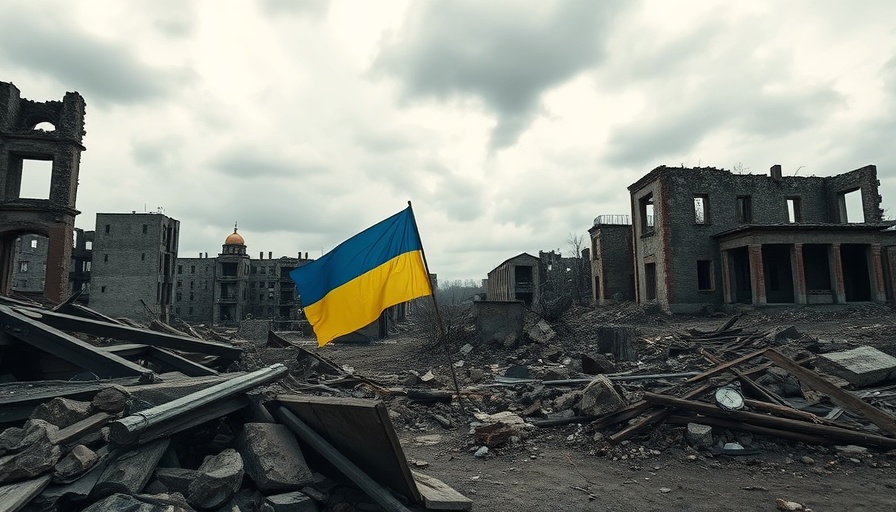
Ukraine's Struggle: Lessons from History and International Relations
As Russia's aggressive stance towards Ukraine escalates once again, it prompts us to reflect on the intricate web of diplomatic history and the implications of past agreements. The ongoing situation highlights a crucial narrative that mirrors older geopolitical strategies, underlining the need for contemporary leaders to learn from history. This becomes especially pertinent for the American political landscape, where international relations are being discussed through the lens of a potential peace deal orchestrated by President Trump.
In 'Learning lessons from history with Ukraine', the discussion dives into how past geopolitical events shape current perspectives on Ukraine's sovereignty.
The Budapest Memorandum: A Cautionary Tale
The roots of Ukraine’s current challenges can be traced back to the Budapest Memorandum of 1994, an agreement that promised Ukraine security guarantees amid its nuclear disarmament post-Soviet Union. The commitment made by major powers, including the United States, was intended to support Ukraine's sovereignty and territorial integrity. However, when Russia seized Crimea in 2014, the lack of meaningful support from the West exposed the weaknesses of these promises and left Ukraine vulnerable.
History Repeating: Current Perspectives on Security Guarantees
Current discussions around security guarantees evoke skepticism, especially in light of past failures. As State Representative Noah Arbery articulated in a recent discussion, previous assurances have proven ineffective, leading to a profound mistrust in future agreements. Ukraine's ongoing pleas for military support and financial assistance underscore their diminished confidence that promises will lead to actionable outcomes. With lessons from the Budapest Memorandum still fresh, it is evident that Ukraine must secure robust commitments that extend beyond mere rhetoric.
Russia's Aggression: Understanding the Implications
As President Trump convenes leaders to discuss a possible resolution between Russia and Ukraine, international analysts remain cautious. The historical context—that geopolitical dynamics are not merely transactional—is vital. The perception of past U.S. responses to Russian expansionism has bred a context in which leaders like Vladimir Putin feel emboldened. The assertion that a close personal connection could yield positive results in negotiations is viewed with skepticism. Historical precedents suggest that lasting stability cannot be achieved through favoritism or perceived weak responses.
The Consequences of Inaction: Future Threats
There is a sense that the international community, particularly European allies, is cautiously optimistic yet deeply wary. With economics tied to military strength, many analysts suggest that a military backing for Ukraine is necessary before any meaningful peace talks can resume. President Putin's actions present ongoing threats, which, if unchecked, could lead to wider regional instability. It is critical to understand that the stakes are high—not just for Ukraine, but for geopolitical stability in Eastern Europe as well.
Engaging Communities: The Local Impact of International Politics
In Detroit and the wider Michigan region, public discourse is increasingly intersecting with international relations. As community leaders speak on a national scale about political ethics, residents are reminded of the interconnectedness of world events to local realities. Economically, the well-being of families in the Metro Detroit area hinges on global political stability. Moves on the international stage can create ripple effects here at home, affecting everything from inflation to job security, particularly in sectors like automotive manufacturing that relies heavily on global supply chains.
Call to Action: Stay Informed and Engaged
As citizens, it’s essential to stay informed about not only local governance but also how international relations impact our daily lives in Metro Detroit. Engaging in discussions around these pivotal events will ensure that community voices are heard and that local leaders are held accountable for their actions regarding international commitments. By participating in dialogues about foreign policy from a local perspective, residents can foster a more informed citizenry that holds power to their words and promises.
In conclusion, our understanding of these historical nuances will be vital as we navigate today's geopolitical climate. How we engage politically at local and national levels can help shape a more secure and politically astute future for both Michigan and the world.
 Add Row
Add Row  Add
Add 



Write A Comment